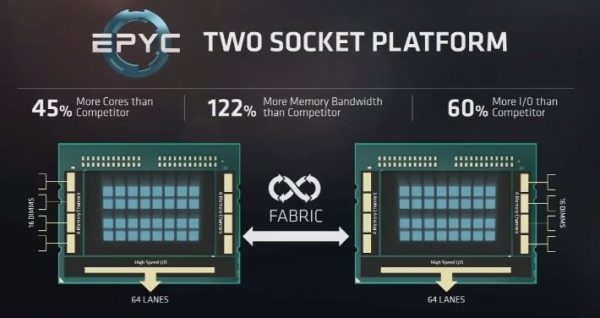AMD has been keen to keep the momentum up ever since it launched the first batch of Ryzen desktop processors in March. We've already heard a bit about the company's plans to take on Intel's Xeon lineup but today, we see the full launch of AMD's EPYC processors, scaling the Zen architecture all the way up to 32 cores.
The EPYC 7000 series offers up to 32 high-performance Zen cores and a diverse feature set, all working together to edge out the competition. AMD CEO Lisa Su laid out the company's main goals for the EPYC series last night, saying:
“With our EPYC family of processors, AMD is delivering industry-leading performance on critical enterprise, cloud, and machine intelligence workloads. EPYC processors offer uncompromising performance for single-socket systems while scaling dual-socket server performance to new heights, outperforming the competition at every price point. We are proud to bring choice and innovation back to the datacenter with the strong support of our global ecosystem partners”.
At a launch event last night, some of the world's largest server manufacturers all announced support for the EPYC platform. This includes the likes of Dell, HPE, ASUS, Gigabyte, Inventec, Lenovo, Supermicro, Tyan, Wistron and Sugon. Beyond that, Microsoft, Red Hat and VMWare all showed optimised application support for EPYC. Samsung is also jumping on board with support for AMD's new server platform, so in all, things seem to be going well. Dropbox has also signed a deal to move over to EPYC CPUs.
So what does EPYC do in the performance department? Well according to AMD's own testing, several records have already been set. A two-socket server based on the EPYC 7601 CPU managed to score 2360 on SPECint®_rate2006, which is higher than any other two-socket system today. A single socket server using the same CPU also managed to score 1200 points in the same benchmark, which AMD says is higher than any mainstream one socket system.
Here is the full lineup of EPYC CPUs with TDPs, core counts and clock speeds:
| Model | Core/Thread | Base Speed | Turbo Speed | TDP |
| EPYC 7601 | 32/64 | 2.2GHz | 3.2GHz | 180W |
| EPYC 7551P | 32/64 | 2.0GHz | 3.0GHz | 180W |
| EPYC 7501 | 32/64 | 2.0GHz | 3.0GHz | 155/170W |
| EPYC 7451 | 24/48 | 2.3GHz | 3.2GHz | 180W |
| EPYC 7401P | 24/48 | 2.0GHz | 3.0GHz | 155/170W |
| EPYC 7351P | 16/32 | 2.4GHz | 2.9GHz | 155/170W |
| EPYC 7301 | 16/32 | 2.2GHz | 2.7GHz | 155/170W |
| EPYC 7281 | 16/32 | 2.1GHz | 2.7GHz | 155/170W |
| EPYC 7251 | 8/16 | 2.1GHz | 2.9GHz | 120W |
KitGuru Says: AMD's EPYC CPUs have officially launched and already, plenty of major companies are showing support for the platform. Now the enthusiast audience just needs to hold on a bit longer for Threadripper.
 KitGuru KitGuru.net – Tech News | Hardware News | Hardware Reviews | IOS | Mobile | Gaming | Graphics Cards
KitGuru KitGuru.net – Tech News | Hardware News | Hardware Reviews | IOS | Mobile | Gaming | Graphics Cards




SuperMicro kept their word…. Spec scores…
Supermicro Supermicro A+ Server, 1022G-URF AMD Opteron 6276 469 419 32 2 16
Supermicro Supermicro AS-1123US-TR4, AMD EPYC 7601 2360 2100 64 2 32